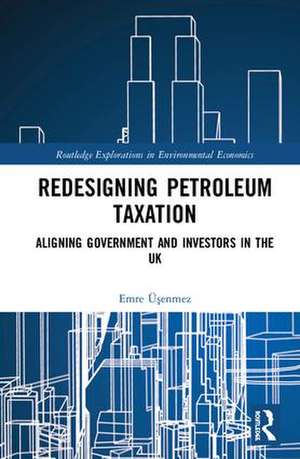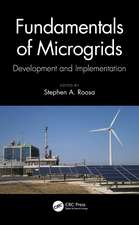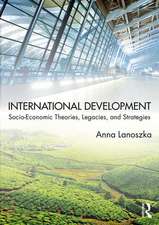Redesigning Petroleum Taxation: Aligning Government and Investors in the UK: Routledge Explorations in Environmental Economics
Autor Emre Üşenmezen Limba Engleză Hardback – 15 oct 2018
Yet achieving that balance and fiscal stability is possible. To understand this possibility, this book first clarifies what is meant by sufficient incentivisation and fair share before developing a new fiscal system that manages this balance and stability. Such clarification yields objective criteria against which to assess not only the existing regime, but also the newly proposed regime. This approach is further complemented by the critical analysis of the fiscal legislative framework and the evaluation of the legal positions of specific contractual elements and mechanisms found within that framework. This latter analysis is important in order to reduce the legal uncertainty such elements may create, which can otherwise lead to further reactive amendments and revisions to the fiscal regime in the future.
| Toate formatele și edițiile | Preț | Express |
|---|---|---|
| Paperback (1) | 382.57 lei 6-8 săpt. | |
| Taylor & Francis – 30 iun 2020 | 382.57 lei 6-8 săpt. | |
| Hardback (1) | 763.81 lei 6-8 săpt. | |
| Taylor & Francis – 15 oct 2018 | 763.81 lei 6-8 săpt. |
Din seria Routledge Explorations in Environmental Economics
-
 Preț: 311.58 lei
Preț: 311.58 lei -
 Preț: 311.18 lei
Preț: 311.18 lei -
 Preț: 314.71 lei
Preț: 314.71 lei - 28%
 Preț: 823.26 lei
Preț: 823.26 lei - 18%
 Preț: 1053.92 lei
Preț: 1053.92 lei -
 Preț: 424.58 lei
Preț: 424.58 lei - 15%
 Preț: 431.75 lei
Preț: 431.75 lei - 17%
 Preț: 289.78 lei
Preț: 289.78 lei - 18%
 Preț: 1403.97 lei
Preț: 1403.97 lei - 28%
 Preț: 827.23 lei
Preț: 827.23 lei -
 Preț: 329.92 lei
Preț: 329.92 lei - 18%
 Preț: 1223.61 lei
Preț: 1223.61 lei -
 Preț: 420.30 lei
Preț: 420.30 lei - 26%
 Preț: 848.93 lei
Preț: 848.93 lei - 18%
 Preț: 1272.54 lei
Preț: 1272.54 lei - 28%
 Preț: 797.37 lei
Preț: 797.37 lei - 18%
 Preț: 1288.46 lei
Preț: 1288.46 lei -
 Preț: 416.05 lei
Preț: 416.05 lei -
 Preț: 279.72 lei
Preț: 279.72 lei -
 Preț: 378.43 lei
Preț: 378.43 lei - 18%
 Preț: 1286.01 lei
Preț: 1286.01 lei -
 Preț: 422.04 lei
Preț: 422.04 lei - 18%
 Preț: 1061.93 lei
Preț: 1061.93 lei - 18%
 Preț: 1060.25 lei
Preț: 1060.25 lei -
 Preț: 493.80 lei
Preț: 493.80 lei - 18%
 Preț: 1336.46 lei
Preț: 1336.46 lei - 18%
 Preț: 1065.06 lei
Preț: 1065.06 lei - 26%
 Preț: 821.46 lei
Preț: 821.46 lei - 25%
 Preț: 1022.48 lei
Preț: 1022.48 lei - 18%
 Preț: 1226.37 lei
Preț: 1226.37 lei -
 Preț: 401.14 lei
Preț: 401.14 lei -
 Preț: 418.22 lei
Preț: 418.22 lei - 28%
 Preț: 824.53 lei
Preț: 824.53 lei - 18%
 Preț: 1169.16 lei
Preț: 1169.16 lei - 18%
 Preț: 1380.52 lei
Preț: 1380.52 lei -
 Preț: 485.61 lei
Preț: 485.61 lei - 18%
 Preț: 1285.17 lei
Preț: 1285.17 lei -
 Preț: 398.44 lei
Preț: 398.44 lei - 18%
 Preț: 1067.84 lei
Preț: 1067.84 lei - 15%
 Preț: 303.64 lei
Preț: 303.64 lei
Preț: 763.81 lei
Preț vechi: 1102.55 lei
-31% Nou
Puncte Express: 1146
Preț estimativ în valută:
146.20€ • 158.86$ • 122.89£
146.20€ • 158.86$ • 122.89£
Carte tipărită la comandă
Livrare economică 21 aprilie-05 mai
Preluare comenzi: 021 569.72.76
Specificații
ISBN-13: 9781138219960
ISBN-10: 1138219967
Pagini: 196
Ilustrații: 13 Line drawings, black and white; 11 Tables, black and white; 13 Illustrations, black and white
Dimensiuni: 156 x 234 x 17 mm
Greutate: 0.43 kg
Ediția:1
Editura: Taylor & Francis
Colecția Routledge
Seria Routledge Explorations in Environmental Economics
Locul publicării:Oxford, United Kingdom
ISBN-10: 1138219967
Pagini: 196
Ilustrații: 13 Line drawings, black and white; 11 Tables, black and white; 13 Illustrations, black and white
Dimensiuni: 156 x 234 x 17 mm
Greutate: 0.43 kg
Ediția:1
Editura: Taylor & Francis
Colecția Routledge
Seria Routledge Explorations in Environmental Economics
Locul publicării:Oxford, United Kingdom
Public țintă
Postgraduate and UndergraduateCuprins
1: Introduction; 2: Government’s Rationale for Fiscal Reform; 3: The UKCS Fiscal Regime Prior to the Fiscal Review and the Case for Its Reform; 4: The post-Fiscal Review Reforms; 5: The New UKCS Fiscal Regime: A Proposal for Reform; 6: Conclusion
Notă biografică
Emre Üşenmez is a petroleum economist and a legal expert in the upstream oil and gas sector. He is a Senior Lecturer in Finance at the University of Aberdeen’s AFG College and a Senior Lecturer in Law at the University of Aberdeen Law School. Until August 2018 he also served as Dean for Internationalisation focussing on China and East Asia at the University of Aberdeen. He is also an associate at the Aberdeen Energy Institute and Aberdeen University Centre for Energy Law (AUCEL). Prior to joining the University of Aberdeen, he worked in the natural resources sector in Azerbaijan and has significant experience working with the staff of national ministries, and state and private oil companies around the world.
He is a Fellow of the Higher Education Academy and holds a PhD in Economics, Finance and Law, an MSc in Petroleum, Energy Economics and Finance, and an LLM in Oil & Gas Law from the University of Aberdeen. He also holds a BSc in Economics and a BA in Political Science from North Carolina State University.
He is a Fellow of the Higher Education Academy and holds a PhD in Economics, Finance and Law, an MSc in Petroleum, Energy Economics and Finance, and an LLM in Oil & Gas Law from the University of Aberdeen. He also holds a BSc in Economics and a BA in Political Science from North Carolina State University.
Descriere
The aim of this book is to discuss the function of the fiscal regime applicable to petroleum extraction in the UK, and the possible theoretical tools that can lend themselves via the tax laws to achieve that elusive balance between attracting investments into the upstream sector and collecting an appropriate share of the revenues in the future.













